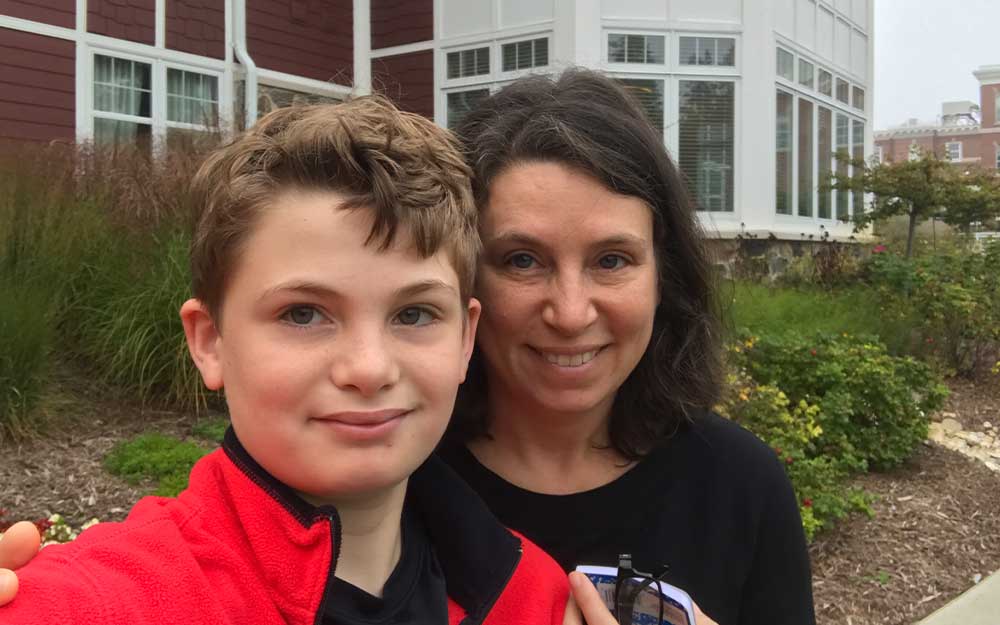“My name is Jake and I’m 20 years old. I’m applying to college to learn music production. I may want to go to grad school to learn about psychology, which is inspired by people on my treatment team.
My story starts with the fact that my earliest memories had some sort of fear involved. I remember being scared of school shootings, car accidents, trees falling on me, and anything that could involve harm or death to me.”
The road to finding OCD and anxiety treatment
“I started taking medication and seeing a therapist when I was in first grade. Over the years, I saw a lot of different people who thought I had general anxiety disorder. I had psychiatrists, therapists, and attended resilience building groups. I had a shadow at school, but nothing anyone did really helped me at all.
I was in eighth grade in a school where I had been since kindergarten and all the teachers had loved and supported me. I should have felt safe. But every day I found myself in the middle school director’s office unable to function because I was sure something terrible was going to happen. Everyone was getting ready for high school, but there was no way I could go on to a new school. One day my mom asked me if I had a gap year before high school, how would I use it? I said, ‘I need to deal with my anxiety. I can’t live like this anymore.”
Rogers understood my OCD
“The intake at Rogers was the first time a professional mentioned OCD. Right before Rogers, I felt incredibly hopeless, depressed, and called myself broken. It didn’t feel like there was anyone else in the world who could understand what I was going through. It felt like everyone in the world was either red or blue and I was green. Even though I had never been on a sleepover except with family, I was willing to do anything, including going to live at Rogers if there was any chance someone could help me.
Rogers saved my life. Everything that has been possible for me is because of Rogers.
I was really scared at the start, but it became clear really quickly that I was finally somewhere where people understood my brain. One of the doctors explained that I had OCD and told me how intrusive thoughts worked. It was such a relief that the people at Rogers understood my suffering and they were very clear they knew how to help me. As they told me stories about many other kids who had come to Rogers feeling like me and then learned the skills to manage their OCD, I started to feel really hopeful.
It was the first time I felt I was with people who understood each other. It made me feel less alone and different. Two of my closest friends over the years have been kids I met at Rogers.
The team at Rogers is absolutely incredible. Every single person had their own way of being helpful, whether it was pushing me past my comfort zone, being there to talk to, teaching me concrete skills, sharing a laugh, or putting up with me even when I made it nearly impossible. They were incredibly creative with the treatment process.
During the first week, I called my mom at one point telling her I had tried doing the exposures assigned to me and it helped. One of the most important skills I had to learn was just sitting with the OCD. I would sit there with a timer to see how long it would take the OCD thought to lessen. And one day the fear went down faster and I was floored. I called my mom and said, ‘You aren’t going to believe this. This is working.
Leaving Rogers was bittersweet. I didn’t want to leave my incredible team. I didn’t know if I could be successful without 24/7 support. I had a community that understood me.
Music has always been and will always be one of my favorite and most powerful coping skills. When life at Rogers and my thoughts were loud, scary, and needed to be suppressed, music was the thing that did that the best. I want to continue to learn music production because I want to make music for other people – music that can help them cope the way music helped me.
There are a lot of things that still stop me from doing things, but fear is not one of them. I have a lot of skills. I don’t have to rely on 24/7 support. I know when something is happening because of the OCD and I have done things I never dreamt I could do. Before Rogers, I could not cross the street without intense OCD thoughts.
Since Rogers, I have a totally different life. I have gone out late at night to nightclubs outside the country. I am scuba certified. I have gone parasailing and I drive a car almost every day. I am applying to go to college in another state. Fear is never the reason I don’t do something.
Don’t wait to get help. I know what it feels like to be in a dark, endless tunnel with nothing but sadness, fear, and confusion. I also know that treatment is the torch to lead you out of that tunnel. Rogers won’t rescue you from the tunnel, but they will meet you halfway if you’re willing to try. OCD does not need to stop you from having the life you want.”


